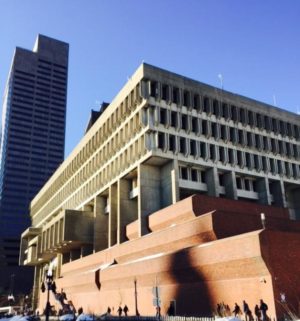One of Boston’s prominent voices on housing and development issues has launched a proposal to dramatically reform the city’s Zoning Board of Appeals in the wake of a scandal that saw a BPDA official take a $50,000 bribe from a developer to influence a board vote on one of his projects.
Councilor Lydia Edwards filed legislation Monday to dramatically change the board’s membership, mandate and ethics guidelines.
“These changes protect against conflicts of interest, improve standards of review, ensure critical perspectives of tenants and environmental protection are represented, and modernize the Zoning Board of Appeal by providing 21st century transparency for all residents,” Edwards said in a statement. “This overhaul is a team effort, and I appreciate that Mayor [Marty] Walsh is already calling for administrative changes. I am looking forward to working with Sullivan and Worcester to ensure we have a comprehensive conversation on ZBA reform. However, many changes will require a legislative revision of the board and this home rule petition is starting that necessary conversation.”
The proposal contains three main thrusts: Removing real estate and construction industry representatives from the board, make it easier for the public to follow – and appeal – ZBA decisions and make developers seeking variances submit plans on how they will mitigate displacement of their project site’s current residents.
Edwards’ proposal would remove 60-year-old system where seats on the board are reserved for industry groups like the Boston Society of Architects and Greater Boston Real Estate Board. Under the proposed new structure, members and alternate members (seven each) of the ZBA would represent perspectives from affordable housing, civil rights and fair housing, environmental protection and climate change, urban planning, homeowners, renters and expertise in zoning and the general laws.
“Real estate interests would be removed from the board,” Edwards’ announcement stated.
People engaged in the construction, development, purchase or sale of real estate could not be on the board. The city of Boston would be able to further require as a condition of appointment that members will not be engaged in the business of real estate construction, development, purchase or sale within the city for up to five years after their term of service concludes.
Staff for the ZBA would also be prohibited from engaging in other permitting, planning, development or real estate functions, and prohibited from engaging in private business in these areas. The ZBA would further be required to publish additional regulations to prevent conflict of interest.
Records would be available electronically and in person at City Hall and 1010 Mass Ave. no later than seven days following a hearing. Notices of hearings would be posted and delivered electronically 20 days in advance. Contact information for the board would be posted electronically. The public would also be able to file appeals electronically, in person, at City Hall or at 1010 Mass Ave.
A new legal support office to provide neutral advice and guidance explaining standards, votes, procedures, the appeal process and other matters relevant to the board of appeal.
All developers seeking variances would have to submit statements of financial interest, and anyone seeking a variance for occupied or recently-occupied structures would have to submit plans to mitigate displacement and to provide information about any recent evictions.
The ZBA would be newly required to consider whether a variance would impact the city’s goals for income-restricted housing, furthering fair housing, preventing displacement and addressing climate change, as well as consistency with neighborhood planning. The board would also have to file a quarterly report on the number and type of conditional use permit or variance granted, by neighborhood and zoning district.




 |
| 


